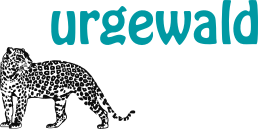Berlin, March 11, 2021
- Revealed: Leading insurers backing fossil gas infrastructure in Europe
- Emissions data underlines harmful impacts of key LNG projects around the world
- Questionable economic situation as LNG is in a state of oversupply
Today, Urgewald released a report highlighting the European insurance industry’s role in supporting fossil gas infrastructure. The paper, which is released as part of the Insure Our Future campaign, names Allianz, Talanx, AXA, Generali and Munich Re as key insurers to big fossil gas projects in recent years, such as the Świnoujście, Zeebrugge and Dunkirk liquefied natural gas (LNG) facilities.
The full report is available at: https://urgewald.org/gas-insurance-report
Regine Richter, energy and insurance campaigner with Urgewald, says: “If insurers take their commitments to the Paris Goals seriously, they need to stop supporting new fossil fuel infrastructure. Major European insurers have led the industry’s exit from coal, and now they must commit to stop underwriting and investing in new oil and gas projects and to phase out existing oil and gas insurance in line with a 1.5°C pathway.”
Burning fossil gas is not a clean alternative
While often being advertised as a “cleaner” bridge fuel by policy makers and fossil fuel companies, LNG has a very harmful impact on the climate. LNG is almost entirely made up of methane, which has 86 times more of a warming effect as a greenhouse gas than CO2 over a 20 year period. New emissions data calculated for the report reveals that the LNG infrastructure projects Zeebrugge in Belgium and Dunkirk in France have a combined emissions potential of 2.3 gigatons of CO2 equivalent over the next 25 years, which is almost three times the annual greenhouse gas emissions of Germany in 2018. In the five years since it came online in 2016, the Świnoujście LNG terminal in Poland has released more than 55 million tons of greenhouse gas emissions, an amount equal to the annual emissions of Finland.
Gas projects are not only destroying the climate, but also have serious impacts on the local environment, public health and Indigenous and human rights more broadly. LNG from the United States to Europe, comprising ⅓ of annual US gas exports, comes primarily from fracked gas associated with a wide range of severe issues, such as groundwater contamination, air pollution and resulting health effects.
LNG’s dire economic situation
Insuring and investing in new LNG infrastructure does not follow market trends, but a tired model of fossil fuel dependent systems that threatens a climate breakdown. LNG infrastructure in Europe is wrought with weak demand and oversupply. Demand for gas is seeing a rapid decline and is projected to fall by up to 19% by 2030 and 85% by 2050. LNG terminals are also expensive to build, ranging from several hundred million to billions of dollars and take an average of 5-10 years to finish.
The UNEP-backed 2020 Production Gap Report clearly outlines a need to reduce fossil gas by 3% globally per year until 2030 if we are to stand a chance of remaining under 1.5°C warming.
Ysanne Choksey, Energy Campaigner with Urgewald and author of the paper, says: “LNG terminals represent future infrastructure for a tomorrow powered by gas. However, this imagined tomorrow is incompatible with a livable world.”
Key demands for the global insurance industry
Insurance companies are a critical pillar of support for the fossil fuel industry. Without their cover, most new pipelines and LNG terminals cannot be built, and many existing operations will have to be phased out. The Insure Our Future campaign demands that insurers immediately cease insuring new oil and gas projects and commit to phase out existing oil and gas insurance in line with a 1.5°C pathway. The group further calls on insurers to divest all assets - including assets managed for third parties - from oil and gas companies that are not in line with said pathway.
Mr. Lindsay Keenan, European Coordinator, Insure Our Future, says: “The Insure Our Future network will take this report to the boardrooms of Allianz, Talanx, AXA, Generali, Munich Re, AIG, Travellers, Zurich, Lloyd’s of London and other relevant insurers, and will strongly urge them to stop insuring and investing in new oil and gas exploration and infrastructure.”
Contacts:
Jacey Bingler, Communications Coordinator, Urgewald
jacey [at] urgewald.org (jacey[at]urgewald[dot]org), +49 175 521 7571
Camilla Schramek, Senior Communications Campaigner, The Sunrise Project
camilla.schramek [at] sunriseproject.org.au (camilla[dot]schramek[at]sunriseproject[dot]org[dot]au), +45 50 22 92 88
Urgewald is an environmental und human rights NGO that focuses on stopping financial flows to destructive projects and industries.
Insure Our Future is a global coalition of NGOs and social movements that is pressuring insurance companies to get out of the coal, oil and gas business and support the transition to clean energy. There are over 20 organisations engaged, including Urgewald and The Sunrise Project.
